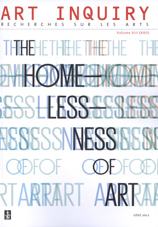Greece – the irretrievably lost home of art
Greece – the irretrievably lost home of art
Author(s): Agnieszka Gralińska-ToborekSubject(s): Cultural history
Published by: Łódzkie Towarzystwo Naukowe
Keywords: classical tradition; modern culture; 19th century aesthetics
Summary/Abstract: The word ‘home’ means not only the place where you live, but also a place where something begins, and a place you belong to. European culture, notably art and philosophy, was born in ancient Greece, and we still affirm that fact. However, within our modern culture, art no longer has a place of residence. When modernism broke with the classical tradition, this was perceived by some theorists not as a sign of maturity, but as uprooting, leading inevitably to the end of art. In their eyes, art has lost a home: religion, beauty and humanity. This problem was strongly emphasized in the 19th century, when art started to gain its independence, which was connected with its parting and separation from classicism (regarded as the only heir to the legacy of classical Greek antiquity). Symptoms of this devaluation of art had been diagnosed earlier, by Johann Winckelmann and Friedrich Schiller, in the second half of the 18th century. The homesickness and nostalgia of art had a strong influence on the Arcadian vision of Greece as a golden land. Undoubtedly it contributed to the 19th century philhellenism. Ancient Greece inspired artists and attracted theorists until the mid 20th century. The enthusiastic reception of Isadora Duncan’s dance is only one example attesting to this fact. The present paper invokes those concepts of art which locate ideal art in Ancient Greece. It enquires which features qualified ancient culture to be the perfect one, and which were lost over time. Consequently, it poses the question about the future of art; whether the revival of art, compared to homecoming, is possible. The experience of contemporary art shows that the return to ancient tradition is impossible and that art must find another place for itself. It appears that the most current conception now is the one which proclaims the end of art.
Journal: Art Inquiry
- Issue Year: 2011
- Issue No: 13
- Page Range: 267-284
- Page Count: 18
- Language: English

